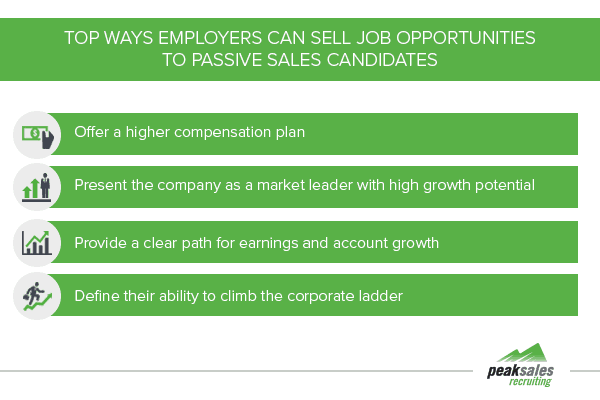To mitigate the risk of losing your best sales candidates, stop treating passive candidates as active job seekers, start valuing the candidate, maintain a strong corporate reputation, and offer market leading compensation packages.
Every organization that is committed to achieving aggressive growth targets requires talent that consistently achieves their sales targets and drive profitable revenue. Unfortunately for employers these salespeople only constitute between 15-20% of the total sales population, which has steeply driven competition up for their services. As a result, the requirement for employers to ensure their hiring and recruitment practices and processes meet or exceed the expectations of these stand-out candidates has been heightened. It has also increased the likelihood that these candidates either do not enter or back out the process when an employer fails to meet the their expectations.
In this article we dive into the latter by listing and analyzing the top reasons why employers fail to meet candidate’s expectations during the recruitment process and what’s causing these elite sellers to drop out of it.
By understanding these factors, sales, HR, and business leaders alike can fine tune their recruitment process and strengthen their ability to recruit the most elite salespeople.
1. You Treat Passive Candidates as Active Job Seekers
Active candidates make up less than 20% of the workforce and are taking tangible steps toward getting another job. They post their resumes online, look at job advertisements, reach out to recruiters, and will do whatever it takes to meet a potential employer’s hiring demands.
Alternatively, passive candidates are not focused on spending their time perusing the job market. They’re performing well in their current roles and are too busy focusing on how they can exceed their sales targets than to be browsing online job listings or reaching out to recruiters. Hiring managers set their recruitment efforts up for failure when they neglect to differentiate between the recruitment expectations of passive and active candidates, and do not tailor their hiring process accordingly.
Expecting passive candidates to articulate why they would be a great fit for the company during introductory phone calls, for example, and requiring them to enter a difficult and time-consuming application processes is one of the most common ways employers fail to tailor their recruitment process to meet the expectations of passive sales candidates.
Top talent won’t take the time to copy and paste their credentials into a cumbersome application and craft a new cover letter that articulates why they should be considered for a position, nor will they devote time to taking calls from front-line recruiters who don’t clearly articulate how their company will advance their career.
There are two changes organizations can make to increase the likelihood that passive candidates enter into and continue through the recruitment process:
First, employers need to sell the opportunity to passive candidates. Changing jobs is a gamble for anyone, especially for salespeople who consistently meet their stretch targets. Employers can ramp up a candidate’s interest in the opportunity by emphasizing how the candidate will advance their career in both the short and long term.
Short-term benefits:
- Increased base and on-target compensation (in the range of 25-30%);
- Working for a market leader or a high-growth success story
Long-term benefits:
- Clear path to for them grow earnings by acquiring larger accounts and territories;
- Ability to climb the corporate ladder
Second, hiring managers need to recognize how valuable each rep’s time and energy is in each stage of the process. One of the most effective ways employers can demonstrate this is by only requiring a resume from the candidate. Employers can take it one step further by making initial conversations with candidates short and hone in on how the candidate will advance their career by joining your company.
When it comes to passive job candidates, the onus is on the employer to make the process easy while appealing to the needs of salespeople who are happily and gainfully employed.
2. You’re Not Valuing the Candidate
When salespeople think that hiring managers don’t value them as candidates, they won’t move forward with the company. There are several ways employers send this message without meaning too.
First, outstanding salespeople, or ‘A’ players know that they are highly coveted because they go above and beyond for their employer. Therefore they expect the same from prospective employers, and it begins with employers being transparent and setting clear expectations about the opportunity and hiring process from the first conversation. There needs to be a cadence to communication that keeps candidates engaged with the organization, and that is open and honest about next steps.
There needs to be a cadence to communication that keeps candidates engaged with the organization, and that is open and honest about next steps.
A common mistake made by employers happens when they do not outline to candidates the number of steps involved in their hiring process, and clear expectations for the timelines around each step isn’t proactively communicated. A lack of clarity on the specifics — the number of interviews and the expected hiring date — can leave sales candidates frustrated. This mistake is worsened when employers miss agreed upon dates and don’t invest the time to inform candidates that there will be changes to hiring timelines.
Although missed dates are understandable, a lack of communications between the employer and candidates greatly increases the likelihood that the candidate may explore other opportunities.
To give your best candidates the impression that you value their time, always detail the timeline for each stage of interview process, including the anticipated response times, expected offer and start dates. Even if hiring managers don’t have an answer, they should reach out and let candidates know they’re working on it. In other words, when in doubt, reach out. Keeping talent engaged and aware of each step in the recruiting process sets a strong foundation for an effective hiring process.
3. Candidates Find Out Your Company Has a Poor Reputation
Top salespeople want to work for high-performing companies that exhibit a record of excellence, have aggressive growth goals, are creating disruptive solutions, and have a members of their sales team who are hitting their quota and earning well above industry average.
When a company has a poor reputation within their industry, they’re not only going to lose out on the ‘A’ player candidates, but research from Harvard Business Review, for example, suggests that these companies will need to pay candidates 10% more than than their counterparts to entice them to join their organization.
To mitigate the risk of losing your best candidates, here are four red flags salespeople watch for when assessing the reputation of prospective employers:
-
- Bad Interview Practices: When hiring managers don’t hold themselves to high standards and embody the best business practices, it reflects on the reputation of the company. Common mistakes such as appearing to be complacent during the interview process, interrupting candidates during conversations, or forgetting interview dates and times can reflect a lack of professionalism in the company.
-
- A Lack of Prestige: When employers fail to gain the respect of competitors’ and partners in the industry, top salesperson know. Not only do most prospective employees read online reviews for a company, they benefit from large and deeply connected networks. Before accepting an offer, the best salespeople talk to contacts in the industry about the reputation of an organization, their management, corporate and sales culture, and the quality of the product and service offering. In particular, salespeople want to believe in what they’re selling. A product or service that is well-received in the marketplace gains the respect of top talent. Throughout the recruiting process, employers need to emphasize the viability of their offering and the extent to which corporate leaders support the sales team to meet their targets today, and well into the future.
-
- No Record of Success: Experienced salespeople want to work on a sales team that has a reputation for surpassing sales quotas and earning large commission checks. Top sellers ask prospective employers questions that gauge the record of the sales organization to determine if the role will provide them the ability to realize a significant upside in earnings. If a sales department has not succeeded at meeting quotas thus far or is brand new, hiring stakeholders need to strategize a new approach. When do not meet the designation of being ‘high-performance’, they need to make a different sell to candidates. Hiring managers should describe the organization as taking a new direction and revamping the infrastructure, sales culture, and processes to support top talent. They need to provide specific examples of how a company is implementing changes, and emphasize the extent to which a new hire can take a leadership role and have a material impact on the organization.
-
- High Turnover: Salespeople who continually meet or exceed their sales goals won’t give up the stability of their role for an organization that won’t serve their long-term interests. A reputation for high turnover in the sales department reflects either a poor hiring and selection process, an unsupportive sales culture, bad management and corporate leadership, poor offerings, or all of the above. In this case, HR, sales, and other corporate leaders need to dig deep, diagnose the cause, and apply a prescription.
An organization’s inability to retain talent means that they don’t have the same leverage as industry leaders in acquiring top talent. Employers who suffer from a history of high turnover benefit from emphasizing new onboarding and professional development efforts when speaking with candidates. Moreover, by addressing long-term problems that diminish a company’s employer brand reputation and offering compensation packages that are above-market, corporate leaders will establish a new precedent that future candidates will find enticing.
4. You Offer Low Compensation Packages
Hiring managers benefit from recognizing compensation as the number one tool to attract the best salespeople in their space. In fact, a survey from PayScale found that higher compensation is one of the top two reasons why employees choose to leave their jobs. Again, offering above-market compensation that aligns with the prestige and the record of the candidate, and sets them up to earn 25-30% more than they currently earn, can make or break recruiting efforts.
When recruiters and hiring managers offer compensation packages that are low or below-market, top candidates will back out of the recruitment process. Top talent won’t settle for pay that doesn’t allow them to meet their financial objectives, regardless of the opportunity.And when successful salespeople change employers, they’re assuming a significant amount of financial risk. So when employers don’t incentivize a transition and demonstrate how they mitigate that risk, they should expect the best of the best to exit the recruitment process.
Employers with lengthy, complex sales cycles with a long new-hire ramp-up time also need to consider implementing a draw to mitigate the perceived income risk for new salespeople while they develop their pipeline. A draw can tip the scales for sales candidates by bridging their income. We recommend that hiring managers negotiate recoverable draws are less than 50% of the variable component of their commission plan.
Don’t Miss out on the Best Candidates…
To successfully mitigate the risk of losing top salespeople during the recruitment process, employers need to ensure they demonstrate respect to candidates, offer transparency, highlight the company’s successes, and provide compensation packages that appeal to these candidate’s thirst to earn more than their peers.
relpost-thumb-wrapper
Related posts
close relpost-thumb-wrapper
Eliot Burdett
He co-authored Sales Recruiting 2.0, How to Find Top Performing Sales People, Fast and provides regular insights on sales team management and hiring on the Peak Sales Recruiting Blog.
Latest posts by Eliot Burdett (see all)
- 20 Of Our Favorite Books About Sales Management and Sales Leadership – October 20, 2023
- How To Make Progress On Your Sales Goal Without A Sales Leader – September 15, 2021
- Augment Your Recruiting Strategy During “The Great Resignation” – July 26, 2021







